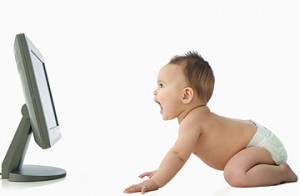When should I start allowing my kids to watch TV?
This is one of many questions often raised during early parenthood stage. Also:
- How many hours of screen time will not cause any harm to our loved ones?
- What should we do if a little TV is what it takes for them to finish dinner, isn’t it better than losing weight?
Yes, watching TV is better than starving, but it’s worse than not watching TV.
Baby’s brain grows into 3 times of its original mass within the first 12 months. What they experience at this stage highly influence brain development. At such young age, every little thing that they see is a new thing, it’s as good as writing something on a white paper.
Imagine a bird in real life and a bird on TV. In real life, bird is a 3-dimensional object. However, whatever shown on screen is 2-dimensional, so the bird is just a flat and curvy creature. If the bird flies from a tree to the rooftop, it swifts in a single motion. You will see the bird leaves the tree, then there’s a shot of it in motion, then a picture of the bird resting on the rooftop.
In real life, your infant can actually touch a bird by moving his body forward and grasping with his hand. In contrast, bird on the screen just disappears, he can never get the chance to touch it with his hand.
It takes 2 full years for a baby’s brain to be able to relate between things that they see on screen with their equivalents in the real world. Good evidence suggests that screen viewing before age 2 has lasting negative effects on children’s language development, reading skills, and short-term memory.
The main problem is not only what they aren’t doing when they spend time in front of the screen. Children, especially those below 2-year-old, learn from interacting with other people. Change in facial expression, various tone of voice, and body language is what boost and excite our little one interest in learning. Whenever either the baby or parent watch TV or other screen entertainment, this interaction stops.
Baby will learn a lot more from throwing small balls while you are preparing dinner rather than from watching a screen for the same amount of time, because when they are throwing balls, both of you will look and check on each other once a while.
In fact, studies show that having the TV on in the background is enough to delay language development. Normally, a parent speaks about 940 words per hour when a toddler is around. Guess what, when the television is on, that number falls by 770. Fewer words means less learning. Toddlers who watch more TV are more likely to find difficulty paying attention for long period at age 7.
Things change when they come to 2-years-old. Well-designed shows can teach kids literacy, math, science, problem-solving and pro-social behaviour. Even then, accompanying children while watching TV is more advisable than letting them watch alone. They do seem to learn a little more if they’re watching in the company of a person who is talking to them about what they’re seeing, in the same way you would while looking at a picture book.
Regardless of the content, we shall cap TV or screen time at 2 hours a day.
Follow Baby Shop SG on Twitter and like our Facebook Page for regular updates on news and article related to babies and parenthood (including offer on Baby Products Singapore)!









Leave a Reply